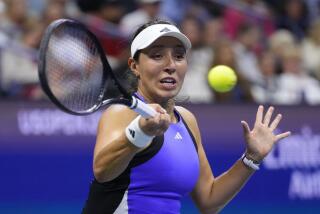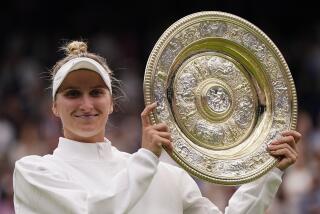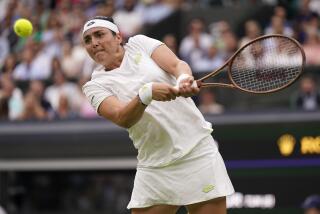Navratilova Proves to Be Too Much : But Soviets Are Pleased by Savchenko’s Surprise Showing
- Share via
OAKLAND — Olga Morozova is a pragmatic woman, therefore, an apparent setback on the tennis court really isn’t viewed as one by her standards.
Essentially, Morozova, the Soviet women’s national team coach, is interested in long-term goals, rather than the short-term for her players.
Which is why she was visibly pleased, even after Martina Navratilova defeated Larisa Savchenko, 6-1, 6-2, in the final of the Virginia Slims of California tournament Sunday at the Oakland Coliseum Arena.
Navratilova, ranked No. 2 in the world, may have won decisively and quickly--in 62 minutes--but, this week, the 21-year-old Savchenko probably took the biggest step in Soviet women’s tennis since Morozova reached the final at Wimbledon in 1974.
There have been other significant accomplishments, to be sure, for the Soviet women since they began traveling once again on the tour in the early ‘80s. The No. 27-ranked Savchenko and her doubles partner, Svetlana Parkhomenko, reached the semifinals at Wimbledon in 1987, breaking the 51-match winning streak of Navratilova and Pam Shriver. Sixteen-year-old Natalia Zvereva, who won the junior Grand Slam in 1987, reached the round of 16 at Wimbledon and made the final at Chicago last year, losing to Navratilova.
But, in Chicago, Zvereva didn’t have the kind of victories Savchenko recorded in Oakland. To reach the final, Savchenko defeated No. 20-ranked Mary Joe Fernandez, No. 6-ranked Hana Mandlikova and, in Saturday’s semifinals, No. 5-ranked Gabriela Sabatini.
Not exactly a bunch of pushovers.
“She’s very happy with the things that have happened this week,” said Morozova, acting as an interpreter for Savchenko. “It was a first in her career against a very tough draw.”
Savchenko, unlike her coach, was visibly upset with the defeat, giving Morozova short, terse answers.
“She’s very tired,” Morozova said later. “I think, in a few days, it will (sink in). . . . I hope so.”
Not to be overlooked was Navratilova’s fine week. She won her second straight tournament, coming off a victory in Dallas last Sunday, and didn’t lose a set in Oakland. Stephanie Rehe got five games off Navratilova in a first-round match and no one would get more than that.
“The biggest difference has been the quality of practice now, that I didn’t have last year,” said Navratilova, who has been working with former touring pro Tim Gullikson since late last year. “And my body, now I can run. I’m pain free.”
Which, for Savchenko, was the biggest problem. Navratilova never gave her a chance to get into the match, taking a 5-1 lead in each set. She also held serve throughout the match, allowing Savchenko only four break points.
Still, Navratilova was impressed with Savchenko’s game, saying the Soviet player has a better first serve and hits her shots a bit harder than Mandlikova.
“She’s a different personality from Zvereva and the other girls,” Navratilova said. “I think that’s what the Russians are doing well. They’re letting the people play their style rather than trying to make them win early.
“Which is what has been happening with the Americans, to win at all costs. Which means the kids have good groundstrokes and nothing else. They win at 14, and they start losing and they never get any better. And that’s why you see the system is working in Russia. They let them develop, and they’re not rushed into things.”
More to Read
Go beyond the scoreboard
Get the latest on L.A.'s teams in the daily Sports Report newsletter.
You may occasionally receive promotional content from the Los Angeles Times.







